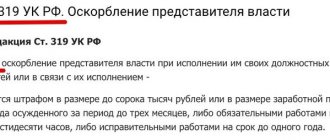Home / Situations
Back
Published: 10/13/2019
Reading time: 3 min
0
450
Federal Law No. 3 of 02/07/2011, regulating the work of the police, makes it mandatory for employees of this structure to observe the rights and freedoms of citizens and obliges them to protect their lives and health. To perform these functions, police officers are given the right to check documents and detain citizens. At the same time, all communications between police officers and citizens are strictly regulated: the rules prescribe the procedure from contacting a citizen to detaining him, if necessary.
- How to behave when dealing with police officers
- Responsibility for insult and resistance to police officers
- Where to complain about the rudeness of a police officer
However, there is a human factor, so citizens often encounter rudeness towards them.
Composition of the offense and legal regulation
Insult is a deliberate humiliation of someone's dignity, expressed in a form that is contrary to the norms of generally accepted morality. The object of insults can be people, objects of art, countries, etc. A special case is insulting a police officer as a representative of government authority.
Additionally
If a crime was found in the actions of the offender, the case of insulting a police officer will be considered in court. In this case, the subject of the offense may be recognized as a legally capable person who has reached the age of 16.
Liability for this offense is regulated by Article 319 of the Criminal Code (CC) of the Russian Federation. The crime is intentionally insulting a police officer with obscenities, unflattering comparisons, and indecent gestures. It does not matter whether the insult was committed verbally or in writing, or whether the content of the offensive message was false or true. Any insult to a police officer while on duty is criminally punishable. It is worth noting that a remark correctly made to a police officer is not an insult. For example: “You are not performing your duties correctly.” Even if this statement is not true, it is not identified as an insult.
When insulting a police officer, the object of the offense is the police officer currently authorized to protect law and order. The subject can be any capable citizen over 16 years of age. Insulting a government official is considered an offense if it was committed in front of witnesses, that is, in public. The crime is implied to be committed as soon as the insult has been expressed (written, shown). Find out more about this type of offense as public insult here.
The severity of the act is determined depending on the circumstances of the offense committed. For example, if the insult was inflicted after the police officer committed some unlawful act against the accused citizen, then the punishment will be minimal.
Where and how to complain
In fact, calling anywhere is practically useless; it is best to write. There are several ways here, but it’s difficult to predict which one will work. Therefore, the most effective way is to file a claim with several authorities at once.
The first is to the manager of your offender. That is, write a complaint addressed to the head of the city Ministry of Internal Affairs or the district police department in which the police officer works.
The second is to file a complaint with the department of personal security , whose main responsibility is to ensure that law enforcement agencies work as they should and do not violate the rights of citizens.
The third instance is the prosecutor's office , which must protect the rights of citizens regardless of who violated these rights. Therefore, the prosecutor's office can even influence the police.
The final authority in trying to achieve justice will be the court . But before you go there, it is better to seek the help of an experienced lawyer to correctly draft and file a claim.
You can, of course, submit complaints to all other authorities by telephone, but it is best in writing. The application must be written in two copies: you will give one to the selected department, and on the second you will have to put a stamp confirming the receipt of the paper, indicating the date and assigned number.
There is no special form for filing such complaints. It is drawn up in any form, but with the obligatory indication of the name of the organization and the official to whom you are filing a complaint. You can find out the name and title of the manager to whom you are going to complain on the Internet - on the official websites of departments.
The document must also include your contact information and information about the law enforcement officers against whom you are complaining (if you do not know their positions and names, describe all information by which they can be identified).
Then you tell in the statement the essence of the conflict, after which you write that you would like your message to be verified. At the end there is traditionally a date and signature.
The difference between insulting a police officer on duty and outside of work
An insult to a police officer can be caused in one of 2 situations:
- during the time when he performs his official duties;
- during the period when he is on vacation.
These situations require different penalties for committing an offense. The first option is considered by the Criminal Code of the Russian Federation (Article 319), the second - by the Code of Administrative Offenses (CAO) of the Russian Federation (Article 5.61).
In the event that a police officer is not on duty, his offender will face administrative punishment for insulting a person. Using obscene language towards a police officer on vacation is punishable by a fine of one to three thousand rubles.
Let's consider an example: gr. Ivanov was detained by police officer Sidorov for drunkenness in a public place. After some time, gr. Ivanov met Sidorov on the street when he was walking with his family, and insulted the policeman, mentioning his arrest for drunkenness. As a result, gr. Ivanov was prosecuted under Art. 319 of the Criminal Code of the Russian Federation. Indeed, despite the fact that the insult did not occur while Sidorov was performing his official duties, the essence of the offensive statements was directly related to the incident that occurred while the policeman was performing his duties.
The article for insulting a police officer during execution provides for differentiation of punishment depending on what was the motivating motive for committing this offense:
- personal hostility towards a specific citizen serving in the police;
- offensive actions towards a law enforcement official.
It is worth noting: insult is not always expressed only verbally. This can also be various publications: in the media (in print, in video), on the Internet (including on social networks). You can read more about punishment for insulting on the Internet in the article https://lexconsult.online/5604-privlechenie-k-otvetstvennosti-za-oskorblenie-lichnosti-v-internete.
After a comprehensive study of the situation in court, the following penalties may be imposed on the perpetrator:
- a fine for insulting a police officer in the amount of 3 months’ salary of the offender (up to 40 thousand rubles);
- forced labor – up to 360 hours;
- correctional labor – up to 1 year.
These penalties can be combined depending on the severity of the violation. A criminal case can be closed if the parties to the conflict reconcile before the case is brought to trial.
For information on existing penalties for insulting a police officer, watch this video
How to behave when dealing with police officers
Most often, citizens come into contact with police officers on the street, in which case the following actions should be taken:
- Politely ask the police officer to introduce himself, name his position and rank, present his service identification card and badge (all police officers serving in public places must have it with them). The basis for such a request is the first paragraph of part four of Article 5 of Federal Law No. 3 of 02/07/2011. If the police officer does not comply with this request, you should politely tell him that by doing so he is violating the Law on Police.
- Copy this data into your notepad or phone.
- Listen carefully to the purpose and reason for the appeal . The police officer must explain the purpose of the appeal, if detention is necessary, the legal reasons for this, and also inform the rights and obligations of the detainee (second paragraph of part four of Article 5 of Federal Law No. 3 of 02/07/2011).
- If you are detained, you must call your relatives or friends, a lawyer, tell them your location , the essence of the policeman’s complaints, and information about him.
Citizens, in order to protect their rights and freedoms, can videotape (or audio record) police actions: at the moment, the legislation does not contain a specific ban on such actions.
When interacting with police officers, you should never be rude, even if the police themselves violate this rule, or use physical force against them or resist arrest.
Stages of investigation of an offensive offense
- The injured police officer submits a statement to the police department or writes a report to his superiors. The application (report) must contain the following information:
- place and time of the offense;
- Full name (if found out) of the citizen who committed it;
- description of actions that offend the dignity of a police officer;
- please punish the offender.
Main conclusions
- Article number 319, which is located in the Criminal Code, comes into force in the event of insulting a police officer.
- If an individual did not limit himself to insults and showed violence, then criminal liability is imposed on the basis of legislative act number 318 of the same source.
- In the case of insulting an official, there are several options for punishment, but if the offender committed actions that were dangerous to the life of the victim, then there is only one type of liability - imprisonment.
- Cases involving insults or violent actions towards relatives of law enforcement officers are also subject to criminal liability.
Mitigating and aggravating circumstances
The court's verdict may be influenced by both mitigating and aggravating circumstances.
Emollients include:
- if an offense of this classification is committed by a citizen for the first time;
- if the insult was made by the accused in response to the misconduct of the police officer.
Aggravating circumstances:
- committing an offense while intoxicated;
- insulting for the purpose of entertainment, without reason or motivation.
An example from judicial practice
Judicial practice has in its archives many criminal cases, one way or another related to Article 319 of the Criminal Code. For example: gr. Utkin, being drunk, started a drunken scandal in the store. The called police tried to reason with the rowdy, but in response they heard obscene language. This was followed by the detention of the offender and charges against him under Art. 319 of the Criminal Code of the Russian Federation for insulting police officers in the performance of official duties. The court decided to impose a penalty on the offender in the form of a fine in the amount of 5,000 rubles.
Find out more on this topic by asking questions in the comments to the article.









